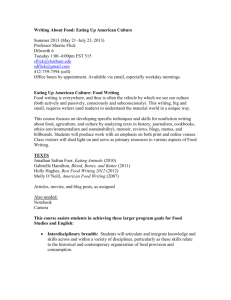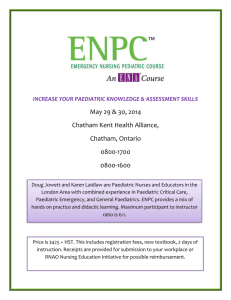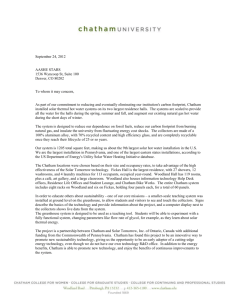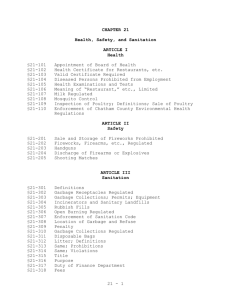MTH 110: Elementary Statistics (Online Course)
advertisement
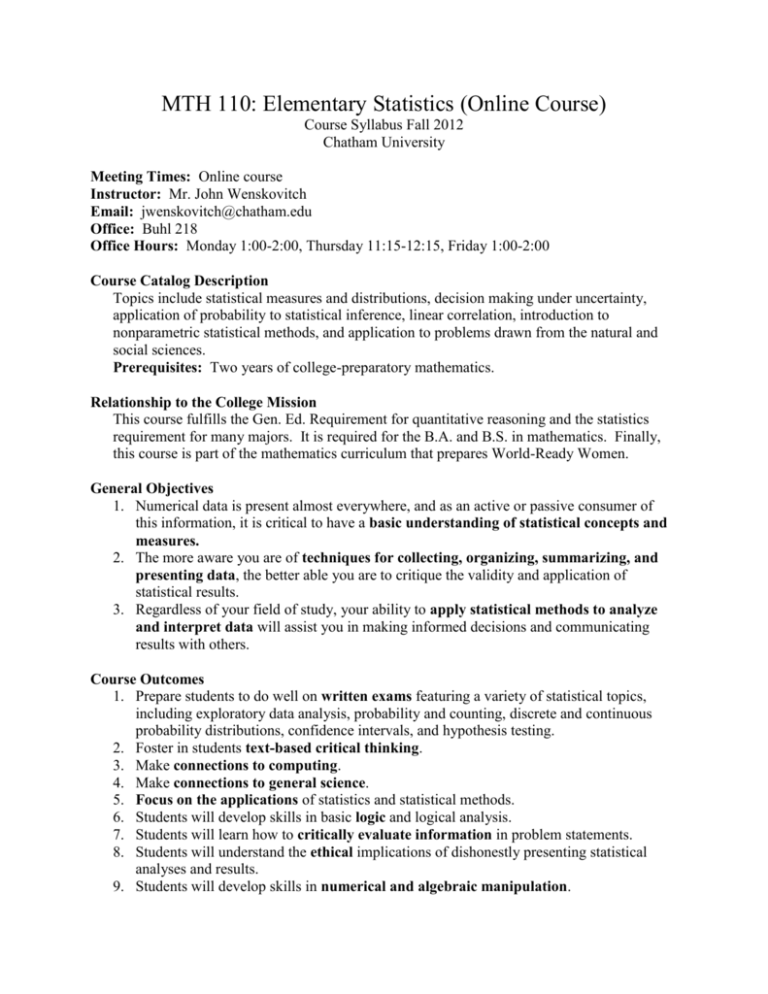
MTH 110: Elementary Statistics (Online Course) Course Syllabus Fall 2012 Chatham University Meeting Times: Online course Instructor: Mr. John Wenskovitch Email: jwenskovitch@chatham.edu Office: Buhl 218 Office Hours: Monday 1:00-2:00, Thursday 11:15-12:15, Friday 1:00-2:00 Course Catalog Description Topics include statistical measures and distributions, decision making under uncertainty, application of probability to statistical inference, linear correlation, introduction to nonparametric statistical methods, and application to problems drawn from the natural and social sciences. Prerequisites: Two years of college-preparatory mathematics. Relationship to the College Mission This course fulfills the Gen. Ed. Requirement for quantitative reasoning and the statistics requirement for many majors. It is required for the B.A. and B.S. in mathematics. Finally, this course is part of the mathematics curriculum that prepares World-Ready Women. General Objectives 1. Numerical data is present almost everywhere, and as an active or passive consumer of this information, it is critical to have a basic understanding of statistical concepts and measures. 2. The more aware you are of techniques for collecting, organizing, summarizing, and presenting data, the better able you are to critique the validity and application of statistical results. 3. Regardless of your field of study, your ability to apply statistical methods to analyze and interpret data will assist you in making informed decisions and communicating results with others. Course Outcomes 1. Prepare students to do well on written exams featuring a variety of statistical topics, including exploratory data analysis, probability and counting, discrete and continuous probability distributions, confidence intervals, and hypothesis testing. 2. Foster in students text-based critical thinking. 3. Make connections to computing. 4. Make connections to general science. 5. Focus on the applications of statistics and statistical methods. 6. Students will develop skills in basic logic and logical analysis. 7. Students will learn how to critically evaluate information in problem statements. 8. Students will understand the ethical implications of dishonestly presenting statistical analyses and results. 9. Students will develop skills in numerical and algebraic manipulation. Student Learning Outcomes Students will demonstrate their understanding of the concepts, fundamental principles, and constraints and opportunities of statistics by: 1. Participating in class discussions of topics being examined. 2. Completing assignments that include both numerical and problem solving questions relating to the course content with a high level of proficiency. 3. Performing well on tests and quizzes that include both numeral and problem solving questions relating to the course content. Teaching and Learning Methods The main mode of learning in this class is reading the textbook and the posted notes, and working assigned homework exercises from the text. Students are responsible for reading assigned portions of the textbook, whether or not the topics are discussed in class. Lectures will provide explanation and emphasis for material and examples in the textbook. The instructor will ask questions to stimulate thinking and participation. Students’ comments and questions are highly encouraged. Some Internet resources will also be used to supplement lectures and discussions. Required Texts and Materials - Required Text: Elementary Statistics, A Step by Step Approach: A Brief Version, Allan G. Bluman, 6th Edition (ISBN: 978-0-07-756766-8) - Calculator: A calculator with square root function is necessary is many of the subject areas we will address. - Software: MS Office Excel, with the Analysis Pack add-on, will be used throughout the course. Students are expected to have a basic proficiency with Excel. - Website: A account at ConnectMath.com for submission of homework and exams. - Moodle: Chatham’s Moodle class management software will be used to post information (syllabus, schedule, assignments, grades, announcements) and to post some assignments. - PACE Center (Library): provides FREE tutoring for all students at Chatham Grading and Evaluation Your total grade for the course will be based on the following, weighted appropriately: - Exam 1 (20%) - Exam 2 (20%) - Exam 3 (20%) - Homework & Quizzes (30%) - Discussion Board Participation (10%) Three exams will be given in this class, spaced roughly 2-3 weeks apart. The exams will be cumulative, as later parts of the course will build on your knowledge from previous weeks. Graded homeworks will be posted online, with due dates at the end of each chapter. Ungraded homeworks will also be provided on Moodle (with answers available in the back of the book) for additional practice, but completing these assignments is optional. The grade scale is as follows, with a plus or a minus added to a grade within 2 points of a break point: A – 90-100 A 4.00 excellent B – 80-89 A3.67 C – 70-79 B+ 3.33 good D – 60-69 B 3.00 F – below 59 B2.67 C+ 2.33 satisfactory C 2.00 C1.67 D+ 1.33 minimal performance D 1.00 D0.67 F 0.00 unsatisfactory performance, no credit Raw grades for the exams are based on the accuracy and merit of the content. In addition, the grades for the exams will be affected negatively if the quality of language use or the mechanics of the calculations undermine the overall logic and credibility of the content. No late assignments are accepted without a documented illness or emergency. If you are unable to attend class for any other reason, you must make arrangements with me to turn in your assignment BEFORE class. Exams must be taken at scheduled times. This includes the final exam. Please check the syllabus and with the instructor BEFORE making any travel plans for the end of the semester. Missed exams will receive a grade of zero without a documented illness or emergency. Students are permitted to collaborate on the procedures and theory behind solving individual homework problems; however, the homework that you submit should be your own (solutions should not be shared), and you must note any and all collaborators at the top of your homework. Attendance Policy The University Catalog states: Every student enrolled at Chatham accepts the responsibility to attend all required class meetings. To obtain the fullest benefit from their courses, students must participate fully. This implies attending regularly, engaging in course activity, completing work on time, and making up work missed because of an emergency absence. In this course, students are expected to keep pace with the assignment list, and follow along with the proposed schedule to keep on pace. Students who begin to fall behind without excuse cannot expect assistance with obtaining missed lecture notes or handouts, and are responsible for obtaining any information regarding changes in assignment due dates, testing dates, and other requirements. According to the University Catalog, the Vice President for Academic Affairs may excuse absences only in the case of a documented illness or other serious emergency. The Catalog also states that it is the student’s responsibility to let the instructor know within the drop-add period at the start of the term if she will have to miss class for religious reasons, athletic activities, or other scheduled events. In the case of an online class, this applies to keeping pace with the proposed schedule. If you encounter schedule conflicts with religious or athletic matters, it is your responsibility to either get ahead in the work before the event, or make up the work afterward. Disability Statement Chatham University is committed to providing an environment that ensures that no individual is discriminated against on the basis of her disability. Students with disabilities, as defined under the Americans with Disabilities Act of 1990 (ADA) and who need special academic accommodations, should notify the assistant dean of the PACE Center as soon as possible. The PACE Center will work with students and the course instructor to coordinate and monitor the provision of reasonable academic accommodations. Cheating and Plagiarism Cheating is defined as the attempt, successful or not, to give or obtain aid and/or information by illicit means in meeting any academic requirements, including examinations. Plagiarism is defined as the use, without proper acknowledgement, of the ideas, phrases, sentences, or larger units of discourse from another writer or speaker. Procedures for handling cheating and plagiarism are discussed in detail in the Chatham University Catalog. Chatham University Honor Code Chatham University students pledge to maintain the Honor Code, which states in part: “Honor is that principle by which we at Chatham form our code of living, working, and studying together. The standards of honor at Chatham require that all students act with intellectual independence, personal integrity, honesty in all relationships, and consideration for the rights and well-being of others.” Information about the Honor Code is available in the Student Handbook. Behavior This is a learning environment, and it is expected that the students and the instructor will respect each other and refrain from any conduct that disrupts the learning process. Such norms are set forth in the Catalog under Student Rights and Responsibilities, and in the Student Handbook under Honor Code and Policies. Please be sure that you have read and understood these materials, as classroom behavior that violates these norms will not be tolerated. Such behavior will be grounds for withdrawal from the class, instigation of dismissal proceedings, or failure of the course. If warranted, students engaging in such behavior will be removed from class by security personnel and may be required to undergo counseling. The use of electronic devices such as cell phones or music players is distracting and not permitted during class. Non-Registered Students Policy In accordance with University policy, only officially registered students may attend this class and all other classes offered at the University after the drop/add period. Please confer with your academic advisor if you need assistance with the registration process or you need additional information. Learning Resources The PACE Center provides tutorial and other types of assistance for any course taught at Chatham University. When you encounter problems in this, or any other, course, you should start by going to your instructor’s office and asking for help. After this, if you find that you need more help, then you should call or visit the PACE Center. Concerns All concerns about the course content, instructional material or methods, or the instructor, should first be discussed with the instructor, in person or through email. If a resolution of the complaint is not achieved, the complaint(s) should be taken to the division chairperson and then, if necessary, to the Academic Vice President. Tentative Structure of the Semester 1. Introduction and Vocabulary (Chapter 1) 2. Exploratory Data Analysis (Chapters 2 & 3) Exam 1 3. Probability and Counting (Chapter 4) 4. Discrete and Continuous Probability Distributions (Chapters 5 & 6) Exam 2 5. Confidence Intervals (Chapter 7) 6. Hypothesis Testing (Chapters 8 & 9) Exam 3 Week 1 Weeks 2-3 Roughly 11/4 Week 4 Weeks 4-5 Roughly 11/25 Week 6 Week 7 Roughly 12/13

